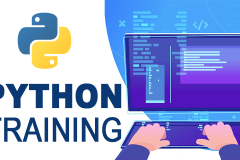1. Introduction to Python:
- Overview of Python programming language.
- Setting up the development environment (installing Python, using an IDE).
2. Basic Python Syntax:
- Variables, data types, and basic operators.
- Control structures: if statements, loops (for and while).
- Functions and modules.
3. Data Structures:
- Lists, tuples, sets, and dictionaries.
- String manipulation.
4. Object-Oriented Programming (OOP) in Python:
- Classes and objects.
- Inheritance, encapsulation, and polymorphism.
- Exception handling.
5. File Handling:
- Reading from and writing to files.
6. Python Libraries and Frameworks:
- Introduction to popular libraries such as NumPy, pandas, and matplotlib for data science.
- Basics of web development frameworks like Flask or Django.
- Working with external APIs.
7. Database Interaction:
- Basic database operations using Python (e.g., SQLite, MySQL, or PostgreSQL).
- Introduction to Object-Relational Mapping (ORM) tools like SQLAlchemy.
8. Web Scraping (optional):
- Basic concepts of web scraping using libraries like BeautifulSoup.
9. Testing in Python:
- Writing and executing unit tests using the
unittestorpytestframework.
10. Introduction to Data Science (optional):
- Basics of data analysis with Python.
- Introduction to machine learning libraries like scikit-learn.
11. Version Control with Git:
- Basics of version control using Git.
- The whole Team can develop and manage code repositories.
12. Best Practices and Code Style:
- Write Clean, readable, and maintainable code.
- We also follow Python’s PEP 8 coding style guidelines.
13. Real-world Projects:
- Real-time projects develop and learn concepts.
- Building practical applications to reinforce skills.
14. Industry Practices and Trends:
- Exposure to current industry practices and trends in Python development.
- Introduction to virtual environments and package management.
15. Continuous Learning and Resources:
- Encouraging a mindset of continuous learning.
- Providing resources for further self-study.
16. Final Assessment:
- Evaluation of the skills acquired through quizzes, assignments, or a final project. Python is the most effective language for Software developers, Data analysts, Website developers, System engineers, and prototype developers.











